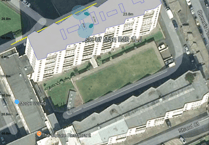The recent launch of the ME/CFS and Long-Covid service is a major breakthrough for those who have spent decades campaigning for it.
Manx Care, which is now offering the service to individuals who have ME or Long-Covid, has worked closely with local charity ME Support.
The charity was set up by Barbara and Robin Proctor in 1988, three years after their son was diagnosed with ME.
At the age of 11, their son had caught a virus on a school trip to Wales. He fell very ill and eventually he couldn’t walk and he couldn’t talk.
Mrs Proctor said: ‘We were desperate to know why a healthy 11-year-old was almost paralysed and couldn’t speak.’
Eventually a UK-based doctor identified that their son had ME (myalgic encephalomyelitis), and told them that the only treatment was rest.
A few months later, doctors in the island took their son off of them, as they thought that Barbara and Robin were making him ill.
Mrs Proctor said: ‘They didn’t believe in ME at all. They didn’t want to accept the diagnosis of the specialists across
‘The doctors must have alerted the social workers, saying that he wasn’t really ill, saying that me, his mother was making him ill.
‘The social workers just arrived on our doorstep one morning, they had the police on standby down the road.
‘They took him to what they called a place of safety, which was the children’s ward at Noble’s Hospital, and we couldn’t find that out until we found a lawyer.
‘Then we were told we could only have 30 minutes with him each evening’
This went on for six months.
Mrs Proctor added: ‘That place of safety was not a place of safety. They took him to a swimming pool, with no aids, his hands were like tight fists, he couldn’t speak, and they just let him go. He sank to the bottom. Can you imagine what that must have felt like?
‘Then they took him on a ghost train, because they thought if they put him on a ghost train on his own he would be terrified, so he would scream, as they thought he was pretending that he couldn’t talk.
‘They took him on a beach another day and started racing the wheelchair down to the sea, thinking that he would be able to grab the arms of the wheelchair, thinking he would shout, which he couldn’t.’
At the time this was reported in the Isle of Man Examiner, and others facing similar symptoms reached out to them.
Eventually they created the group ME Support, where they would speak to individuals with ME about their experiences, but also campaign for ME to be accepted and treated in a medical setting.
Mrs Proctor said: ‘Our aim has been what Juan and the rest of the team at ME Support have got now, that it is accepted, there are people in the hospital now that will help people who have ME.
‘Juan Corlett and the team at ME Support have fought so hard to get the dreams we had, and they have actually achieved it.
‘We are so proud of them.’
She added: ‘We do want the service to extend to children.’
Juan Corlett, chief executive officer of ME Support, said: ‘Barbara is a truly remarkable woman and was the driving force behind our charity for almost two decades.
‘The amazing bravery of the Proctor family was extraordinary – to share their story during a time when this was not common practice and in the face of cynicism from medics. They created the foundations for what has happened in recent years.’




.jpeg?width=209&height=140&crop=209:145,smart&quality=75)